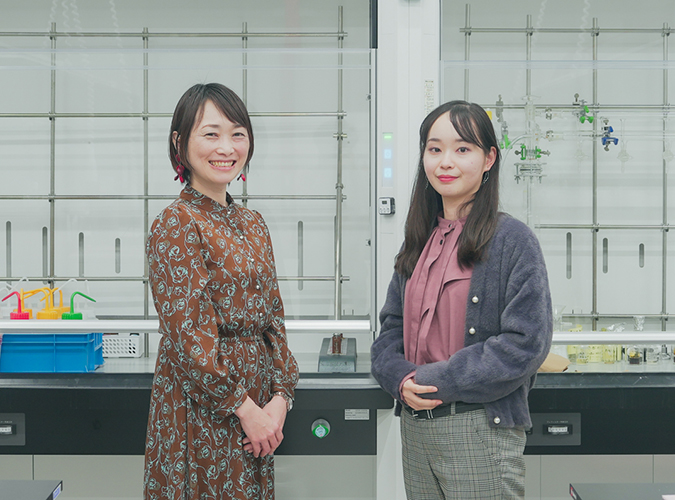150周年記念企画
「未来を拓く青学マインド」
好きと衝動を大切に、打ち込める仕事を
|校友・卒業生|
株式会社雨風太陽代表取締役
高橋 博之
×
コミュニティ人間科学部 コミュニティ人間科学科 4年
石川 太一
2024年、青山学院は創立150周年を迎えました。この間、数多くの卒業生が自身の能力を生かして、幅広い分野で貢献し社会にインパクトを与えてきました。今回は、青山学院大学経済学部で学び、現在は農家や漁師と直接やりとりして食材を購入できるアプリ「ポケットマルシェ」などを運営する株式会社雨風太陽代表の高橋博之さんに、将来公認会計士となって地元で第1次産業継承のサポートをしたいというコミュニティ人間科学部の石川太一さんがインタビューします。第1次産業や地方の活性化から今後の生き方まで、幅広いテーマで語り合いました。
Profile
株式会社雨風太陽代表取締役
高橋 博之
経済学部 経済学科 卒業

1974年岩手県花巻市生まれ。2006年から岩手県議会議員を務め、2011年9月岩手県知事選挙に出馬、次点で落選し政界を引退する。2013年、雨風太陽の前身となるNPO法人東北開墾を立ち上げ、生産者の物語とつくった食べ物がセットとなった『東北食べる通信』を創刊。現在は全国各地に「食べる通信」を広げている。2016年、生産者と消費者を直接つなぐスマホアプリ「ポケットマルシェ」を開始。2023年12月株式会社雨風太陽を東証グロース市場へ上場。

コミュニティ人間科学部 コミュニティ人間科学科 4年
石川 太一
愛知・私立東海高等学校出身
経営学・キャリア論を専門とし、アントレプレナーシップ論も受け持つ宇田美江先生のゼミナール(ゼミ)に所属し、経営やマーケティングを中心に学ぶ。いちご農家を営んでいた実家が事業売却をする時に会計に興味を持ち、現在は公認会計士をめざして勉強中。将来は、地元で会計事務所を開き、1次産業をはじめとする地域の企業のM&Aをサポートし、後継者不足対策や地方経済活性化に貢献したい。
TALK THEME
1st TALK
「第1次産業に従事する人を
増やすには?」
生産者のストーリーを多くの人が
知ること、
他者の評価よりも
自分の「好き」を大切にすること

私は知多半島の真ん中辺りに位置する愛知県半田市の出身です。2年前に事業売却をしましたが、実家はいちご農家とそれを利用した飲食店を営んでいました。知多半島は漁業も身近で、1次産業に尽力されている高橋さんの活動に興味を持っていました。
生産者のストーリーとともに食べものがセットで送られてくる「食べる通信」、買い手が生産者と直接コミュニケーションして買い物ができる「ポケットマルシェ」など、つくり手が情報を発信できる事業が素晴らしいと思います。

石川さん

高橋さん
ありがとうございます。戦後はとにかく食べものがなかったので、安く大量に安定供給することが1次産業には求められました。消費社会が完成され量が満たされている現在は、生活の質を高めることが重要です。どんな人がどうやってつくっているのか、それがわかると消費に意味が生まれて、生活の質が高まるのですね。生産者側も、以前はつくって出荷したらそこで終了でしたが、今は買ってくれた人からのフィードバックがあるのでモチベーションも高まっています。
実家やその周りの農家の方を見ると、うまくいっている人は、生産するだけでなくその出口を設計していると感じます。消費者に情報を発信しつつ直接売れるシステムは、生産者が納得のいく形の出口になっていると思います。

石川さん

高橋さん
ポケットマルシェでは、お客さんと双方向でつながって、ダイレクトマーケティングができます。さらには、生産者に熱心なファンが着いて、口コミで広げてくれることも多くあります。「お客さんを知る」はマーケティングの基本ですが、生産者側は知る機会がなく、難しかったんです。ポケットマルシェでは、双方向のやりとりを活発にして生産者が「売る力」も付けられるように、私たちは基本的には間に入らないようにしています。
私は、実家が事業売却をする時に会計学やM&Aに興味を持ち、現在は公認会計士をめざして勉強しています。担い手不足や後継者不足が叫ばれる中で、将来は地元で事業継承の手伝いができたらと思っています。高橋代表は、こうした課題についてはどのようにお考えでしょうか。

石川さん

高橋さん
今ちょうど、担い手や継承する人がいないという課題にも力を入れ始めています。例えば、東京の会社経営者が北秋田市に移住して、リモートで会社経営の仕事は続けながらセリの生産技術を学んでいます。この方はセリ農家のファンで、セリをずっと食べ続けたいから副業にしたというのです。また別の事例としては、横浜出身の方が家族とともに東松島市に移住し、わかめの養殖業を引き継いだこともあります。
農業や漁業は地縁・血縁に紐付いていることが多いため、新規参入が閉ざされているのが現実です。しかし、農業も漁業もやりたい人が引き継いでいけることが大切だと思います。ですので、都市の人と担い手不足に困っている人をつなげるサービスを行っている会社と提携も始めました。
周りを見ていると、就職するならなんとなく東京のオフィスで働くホワイトワーカーと考えていて、1次産業は最初から視界にも入っていないようなのです。

石川さん

高橋さん
そうですね。それには二つの問題があります。
一つは、東京の一極集中の問題。戦後には地方から若者が集団就職で東京・大阪・名古屋の三大都市圏に出てきて、主に第2次産業に就きました。そしてそのまま都市で新しい世代を育てたことで、首都圏で生まれ育った人たちの多くは、地方の「ふるさと」がなく、農家に出会う機会がない人がほとんどです。農業や漁業はテレビでしか見たことのない世界で、選択肢として入ってこないのでしょう。
もう一つは、やりたい仕事がないということ。日本社会ではずっと「ちゃんとしなさい」と教わります。これは、周りから高く評価されるようにはみ出さないで生きなさいという意味ですが、その分好きなことに蓋をして生きることになってしまいます。社会に出るときには、やりたいことを見つける必要がありますが、長い間自分の「好き」や「意思」に蓋をしてきてしまうと、「本当にやりたいこと」が見つからないわけです。
確かに他人や世間の評価を気にしがちというのはあると思います。

石川さん

高橋さん
アメリカの大手調査会社・ギャラップ社が日本で行った調査*では、仕事に熱意を持って取り組めているか尋ねられて「はい」と答えた人は、わずか5%だったそうです。残りの95%は、出社してもただ終業時間がくるのを待っているような生活をしているわけです。食べるためには仕方がないと嫌々働いて、それを毎日、毎年繰り返している。そんな不自然なことはない、と思うけれど、それがこの社会では自然なことになってしまっているような気がします。
「好きなこと」ではなく、世間で評価の高い会社に就職することが当たり前という風潮が、1次産業が選択肢にならない背景にもなっていると思います。生産者のストーリーを多くの都市住民に知ってもらうことで、間接的にでもその解決につながることを願っています。
*2023年版ギャラップ職場の従業員意識調査:日本の職場の現状
2nd TALK
「地方にもっと関心を
持ってもらうには?」
都市と地方をかきまぜて、
人々が関わり合う世の中を
つくり出していきます

1次産業だけでなく「地方に赴任するのは嫌だ」と言う友人も多いです。

石川さん

高橋さん
わかります。地方に馴染みのない人が本当に多いですからね。今、雨風太陽は「関係人口*カンパニー」として、分断している都市と地方が関わるきっかけをつくっています。「ポケットマルシェ」のサービスは、単なる食べ物の売買だけではなく、生産手法や生産者の日常の発信、購入者から生産者に送る感想や食卓と家族の写真などを通して、人間同士の関わりが生まれる場を提供しています。
また、「ポケマルおやこ地方留学」というサービスも展開しています。ポケットマルシェの生産者のところに親子で泊まって自然体験ができるプログラムです。このような経験を通じて、参加者はその後もその生産者から食べものを買ったり、翌年も帰省をするように訪れたりと、継続的な関係が続いていきます。満員電車で疲れた都市の人にはゆとりをもたらし、人口が減っている地方には、入れ替わり立ち替わり人が来ることで活力がもたらされるでしょう。
*関係人口
移住した「定住人口」でもなく、観光に来た「交流人口」でもない、地域と多様に関わる人々を指す言葉
子どもの頃から、地方に関わりを持てるのは素晴らしいですね。こうした事業がもっと広がることで、都市の人と地方の人との対話が生まれれば、お互いを理解し合う機会が増えると思います。これにより、地方を敬遠する人が減り、地方の魅力を知る人が増えることで、地域全体がより活気づくのではないでしょうか。

石川さん

高橋さん
そうだね。幼い頃に地方を経験した人は、地方や1次産業に親近感を持つようです。リモートワークも一般的になり、これからはライフステージや希望に合わせて生活をデザインする時代がきます。
私は「都市と地方をかきまぜる」と言っていますが、もっと世の中を流動的にして、将来的には都会と地方を行ったり来たりする二地域居住が普通になるようにしたいと思います。
関係人口を増やすということで2023年12月にインパクトIPO*をされました。公認会計士をめざす上で、経営手法にも非常に興味をもっています。株式を上場してから何か反響はありますか。
*インパクトIPO
社会にポジティブな影響(インパクト)を創出している企業が、そのインパクトを企業価値として株式を新規上場(IPO)すること。雨風太陽では、生産者と消費者の間での「顔の見える流通をした額」「コミュニケーション量」、「都市住民が生産現場で過ごした延べ日数」をインパクトの指標としている

石川さん

高橋さん
今年の1月から地震で被災した能登半島を拠点にして、復興の手伝いをしています。「上場して間もないのに大丈夫なの?」と心配されることもありますが、「経済性」と「社会性」を両立することを標榜した「インパクトIPO」を行ったわけです。今日本で最もインパクトを必要としているところは能登半島ですから、行かない理由はありません。この考えに賛同してくださる人と仲間になりたいと思っていて、これからファンや株主を増やしていきたいと考えています。
本当に問題を解決するために行動している会社であることを広めたいですね。

石川さん

高橋さん
私は、震災の復興でも社会性と経済性を両立させなくてはいけないと考えています。
現在の活動について「いいことだけどお金にならない。」と言われることがあります。しかし、社会に求められる「いいこと」であるなら、経済的にも成り立たないとおかしいのではないのでしょうか。NPOやボランティアももちろんとても大切ですが大勢ができるわけではありません。経済的に成り立つなら、参加する人は増えるはずです。能登で持続可能なビジネスをつくり、経済性も確立しながら社会を変えていきたいのです。
3rd TALK
「膨大な選択肢から自分に
合った未来を選ぶには?」
頭で考えすぎないこと。
偶然の出会いと自分の中から
湧き上がってくる衝動を大切にして

私は父から、有り難いことに「30歳くらいまでは好きなことをしていたら」と言われ、大学院に進学して会計を学ぶことにしました。その進路決定には満足していますが、膨大な選択肢が広がっていることに迷ってしまうところもあります。

石川さん

高橋さん
素晴らしいお父さんだね。私も同じ意見だな。30歳くらいまでは急がないでいいですよ。そこで迷うのは少々考えすぎな気がします。先ほども「好きなこと、やりたいことがない」という話がありましたが、皆さん頭で考えすぎです。
恋をする時に、好きな人を考えて見つけませんよね。たまたま同じクラスでたまたま同じ文化祭のチームになって、話をする機会が増えたらつい気になってしまって、いつの間にか好きになるわけです。仕事や自分の道も同じです。頭で考えるのではなくて、自分の中から衝動のように湧き上がってきて止まらない思いがあるはず。パーパスや目的も、頭で考えて見つけるものではなく、降ってくるものなのです。
自分がやりたいことや仕事として打ち込むものは、人を好きになるみたいに降ってくるものなんですね。

石川さん

高橋さん
人は出会った人に影響され、その出会いの積み重ねが人生ですが、いろいろ考えても人との出会いは予期できません。本や映画もそうです。何に出会うのかは、自分でコントロールできないものです。出会い頭の事故が大事なんですよ。「30歳くらいまでは好きなことをしていたら」というのは、レールから外れて道草をしていたら、出会いの確率が高まるということです。その道草がきっと人生の宝になりますよ。石川さんのお父さんはすごいです。そこまで言える親はなかなかいませんよ。
お父さんはいちご農家をやられていたという話でしたが、昔からの家業を継いだのですか。
いいえ。父が起業しました。事業売却後は、どうしてもやりたいことだと言って、高校生以下が無料で使えるサッカーグラウンドを提供する事業を進めています。

石川さん

高橋さん
お父さんは本当にすごいね。まさに「自分の中から湧き上がってきたこと」を表現せずにいられない人じゃないですか。
確かにそういう感じですね。

石川さん

高橋さん
やりがいをもって仕事に取り組む、5%に入っている人だね。そういう大人が増えていくと、だんだん社会も変わっていくと思います。石川さんも、選択肢が広いから迷いが出ているとのことですが、これからさまざまな出会いできっと湧き上がってきますよ。
私は実は、新聞記者になりたくて就職浪人している時に、偶然ゼミのOB・OG会で政治家の先輩に会い、その人の仕事をサポートすることになって政治の世界に触れました。そのうち、自分で政治に携わるようになって地元岩手で県議会議員を務め、その後、1次産業と地方を活性化する仕事を選びました。その間にたくさんの出会いがありました。
そういう意味では、青学は全国からいろいろな人が集まってくる大学で、たくさんの多彩な人と出会えた経験はよかったと思います。
そうですね。私も、男子校だった中高時代から変わり多様な学生と関わることができています。芸能活動と学業を両立させている友人もいて、面白いなと感じます。

石川さん

高橋さん
ぜひ、いろいろな出会いのあるところで道草をしながら、自分の中から湧き上がってくるものを見つけてください。出会い頭のためには、どんどん外に出て、面白そうなこと、好きなことを試してみたら良いですよ。違ったら、また次のものを探せばいいんです。
はい。まずは興味のある会計を本気で学び、出会い頭も楽しみにしたいと思います。今日はありがとうございました。

石川さん


After Interview
夢に向かい、石川さんが高橋さんとの対話から得たヒントは?

出会いによって進む道が変わる可能性も考えていたい
農業が身近な環境で育った私には、農業がまだ伸びる業界であり、もっと多くの人に注目してほしいという思いがあります。都市の人と地方の人との関わりを生むことを実行していらっしゃる高橋代表のお話を伺い、農業や地方を知り、関心を持つ人が増えることに希望が持てると感じています。急がずいろいろな出会いを体験することが重要というお話は特に身に沁みました。その時々の出会いによって自分の進む道が変わっていく可能性をいつも考えて、「出会えた」と思った時には、その衝動に従ってルートを変更できる馬力を持つことも大切にしたいと思いました。





















